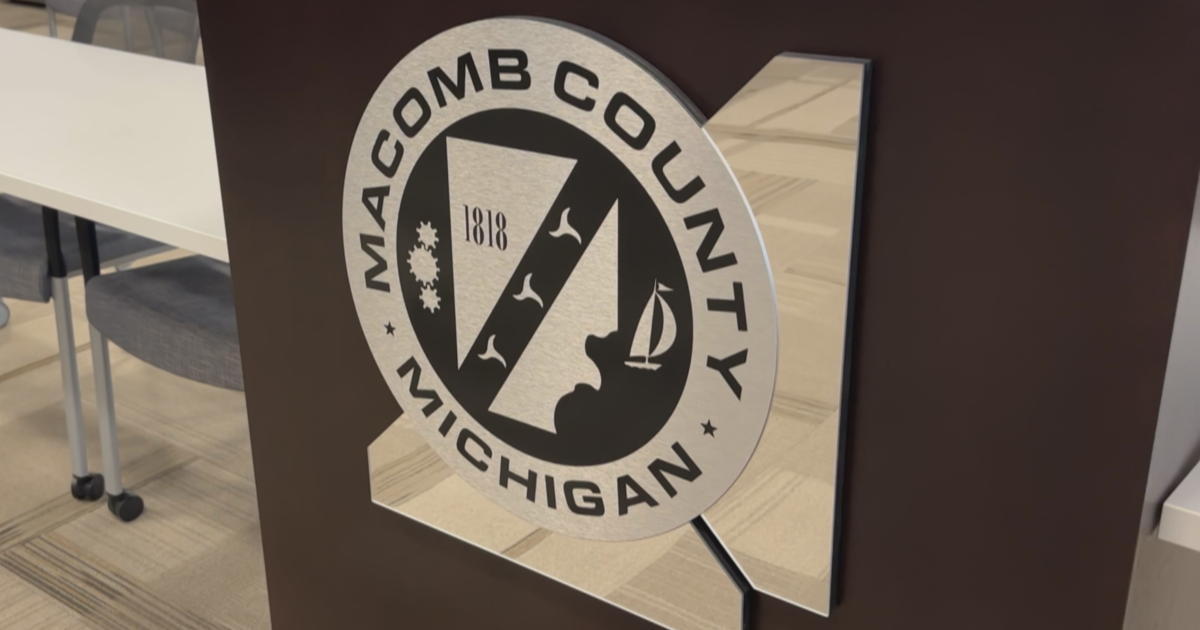Accelerate Michigan Competition Looks To State's Tech Future
DETROIT (WWJ) -- To say Grace Hsia has just a tiny little bit of enthusiasm about her startup, Warmilu, is like saying Ndomukong Suh is just a tiny little bit intimidating to an opposing quarterback.
But then, it's a great idea. All she wants to do is save the lives of thousands of infants around the world who die each year of hypothermia with a low-cost warming kit.
A self-described materials science nerd, Hsia was visiting this week's Accelerate Michigan Innovation Competition. She presented at the event last year, and this year was checking out other presenters, potential partners and at least one potential competitor. She was also there in her capacity as project manager of the First Customer Program of the UM's Institute for Research On Labor, Employment and the Economy, which assesses startup company ideas and identifies key steps they can take to get into markets.
Warmilu uses a phase change material that starts as a liquid and then changes to a solid. The solidification starts with a metal disk in the phase change material that when bent causes the liquid to solidify -- releasing heat in the process.
The great part about the technology is that the product can release heat without electricity -- which is often absent or unreliable in developing countries. And by putting the pack into boiling water, the heat pack is reusable time and time again.
Hsia said the company can be profitable even at low volumes, because the pack costs $10.50 at low volumes -- but can be driven at high volume to under $1. She said that with assembly and shipping, it should cost about $10 to non-government organizations.
She's looking to India and South America for distribution. Check out the technology at www.warmilu.com.
Listen to an interview with Hsia at the link below.
Then there's Jim Eliason, who wants to send thousands of stem cell development kits to researchers all over the world. His MitoStem, located at Detroit's TechTown, has already won awards at other pitch competitions, including the Great Lakes Entrepreneurs Quest.
Eliason has developed an advanced, easier, less expensive way to turn skin and blood cells into induced pluripotent stem cells -- cells that can be induced to grow into practically any type of human tissue. Possible uses of the stem cells include dread diseases like diabetes, Parkinson's and Alzheimer's.
Listen to an interview with Eliason at the link below.
A total of 82 presentations took place at Accelerate Michigan Wednesday and Thursday at Detroit's Book Cadillac Hotel and Orchestra Hall.
Accelerate Michigan executive director Lauren Bigelow said Michigan has come a long way in just the four years of the competition, not to mention the past decade or so. There's now a full entrepreneurial ecosystem of angel investors, venture capitalists, and state funds to fill in the gaps -- along with the network of consultants, lawyers, accountants and other service providers who are willing to work with entrepreneurs and maybe be a little flexible on how and when they get paid in order to help a startup get launched.
Geoff Horst, chief science officer of last year's $500,000 winner, Algal Scientific, described how his company has grown in the past year. The company is developing algae-based production for a chemical called beta glucan that is used as an animal food supplement. Horst said the beta glucan is far cheaper to make using algae than current yeast-based production methods, and can be used as an antibiotic for livestock -- ending problems with antibiotic-resistant diseases. Horst said a study showed Algal's product saved 11 cents a chicken in a test on a commercial poultry farm, which multiplied over millions of chicken is hardly, well, chicken feed. Algal is moving into a larger headquarters in Northville, and will be able to boost production to 500 tons a year from the current 50.
In the student competition, the University of Michigan's three year grip on first place was broken. First place and a $25,000 prize went to Soletics of Grand Valley State University, a developer of gloves and jackets heated by solar energy for outdoor sports wear. Second place and a $15,000 prize went to SIB Medical Technologies LLC of Wayne State University, developers of a sample collection device for home stool samples. Taking third place and a $10,000 prize was AirFuel of Michigan State University, which builds miniature lightweight wind turbines to provide off-grid electricity.
The other finalists in the student competition were Action Glow - 45th Parallel Lighting LLC of Northwestern Michigan College, a developer of LED lighting for sporting equipment; All Things Weaved of Grand Valley State University, which an information hub of hair and skin care for African-Americans; Bar2Bar Transportation of the University of Michigan, a provider of safe transportation for those imbibing at nightspots; Herd Products, no description provided; NanoGolf of Michigan State University, a golf accessories manufacturer; Show Town of Wayne State University, a website through which bar and restaurant managers can book musicians and musicians can promote themselves; SnapScript of Michigan State University, a patient medication organizer for the mobile phone; and Soup Spoon of the University of Detroit Mercy, an assistive eating utensil for the disabled and elderly. (There were 11 student finalists instead of the planned 10 due to a tie for 10th place.)
In the adult competition, the $500,000 top prize went to Varsity News Network, a Web site for high school sports communications based in Grand Rapids. Second prize of $100,000 went to Covaron Advanced Materials, an Ann Arbor developer of advanced ceramics that can be cured at low temperatures. Third prize, and $50,000, went to REL Inc., an Upper Peninsula developer of patented metal matrix composite brake rotors.
Other sponsored prizes of $25,000 each went to: DTE Energy award, Inmatech Inc., a University of Michigan spinout making advanced capacitors for energy storage; NextEnergy award, Wave Aircraft, a West Bloomfield Township developer of unmanned aircraft; Masco Corp. advanced materials award, LiteBrake Tech LLC, an Upper Peninsula company commercializing a steel clad aluminum brake rotor; IT industry award, PlanReaction, an Ann Arbor company developing technology to create floor plans for architects quickly; products and services award, Pindrop Inc., which develops indoor mapping and location technology to assist consumers and enterprises in finding products and assets; next-generation manufacturing award, AutoBike, a developer of an electronic automatic shifter for bicycles; medical device award, ENT Biotech Solutions LLC, a Detroit company making a surgical tool for adenoid removal; and life sciences award, Cure Launcher, a healthcare IT company with patent-pending technology to match patients to clinical trials based on their unique condition.
Turtle Cell LLC, a developer of a cell phone case with retractable earbuds, won the $10,000 People's Choice award in voting of attendees at the event.
Other finalists making presentations Thursday night were Blaze Medical Devices, developer of blood transfusion medical devices; First Sense Medical LLC, which has developed advance breast cancer detection technology; and Upland Nanotech LLC,which is developing diagnostic sensing systems for food safety.
Thursday night's event also saw the presentation of Accelerate Michigan Spirit of Michigan award to Fred Keller, founder and CEO of Grand Rapids-based Cascade Engineering, a plastics molder that has branched out into renewable energy and other fields. Keller told the crowd that "building a business is inextricably linked to building a community," because business can do things for a community that government and nonprofits can't -- like, in his case, putting people on welfare and ex-convicts to productive work.
VMware CIO Tony Scott delivered a keynote address that started with a whimsical video about how a CIO is expected to know just about everything. Before taking the job last summer, Scott served for five years as Microsoft's CIO, leading its 4,000-member IT department. Before that, he had served as CIO of Disney, and had led technology and operations departments at General Motors and Bristol-Meyers Squibb. Scott spoke about how the phrase "going to work" has become meaningless -- because work is no longer a location. He said social media, the cloud and big data are shaping both work and the economy, and that the major challenges facing business today are ever-increasing speed and the fragmentation of media. And he said virtualization is breaking the bond between hardware and operating system.
More about Accelerate Michigan at www.acceleratemichigan.com.



